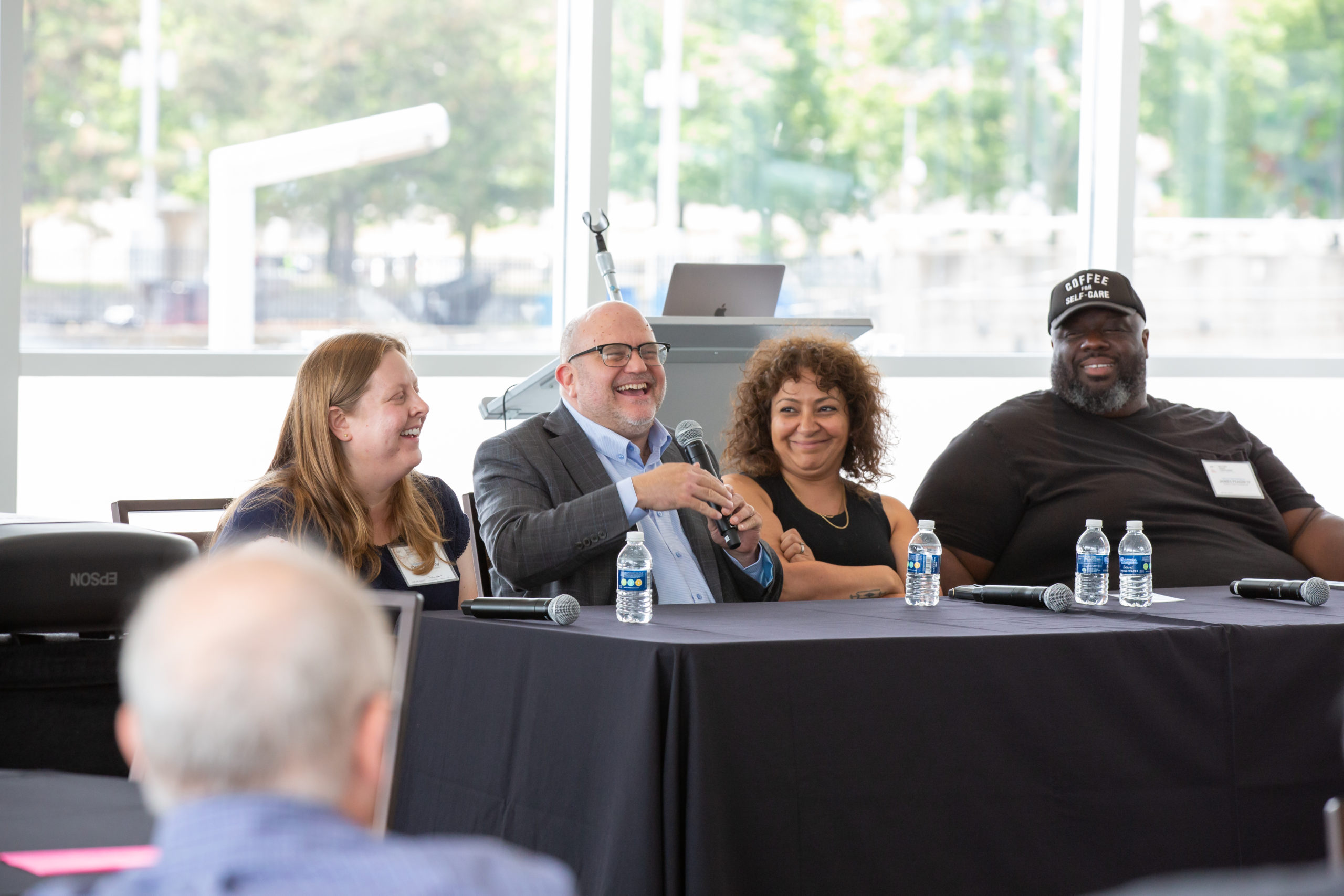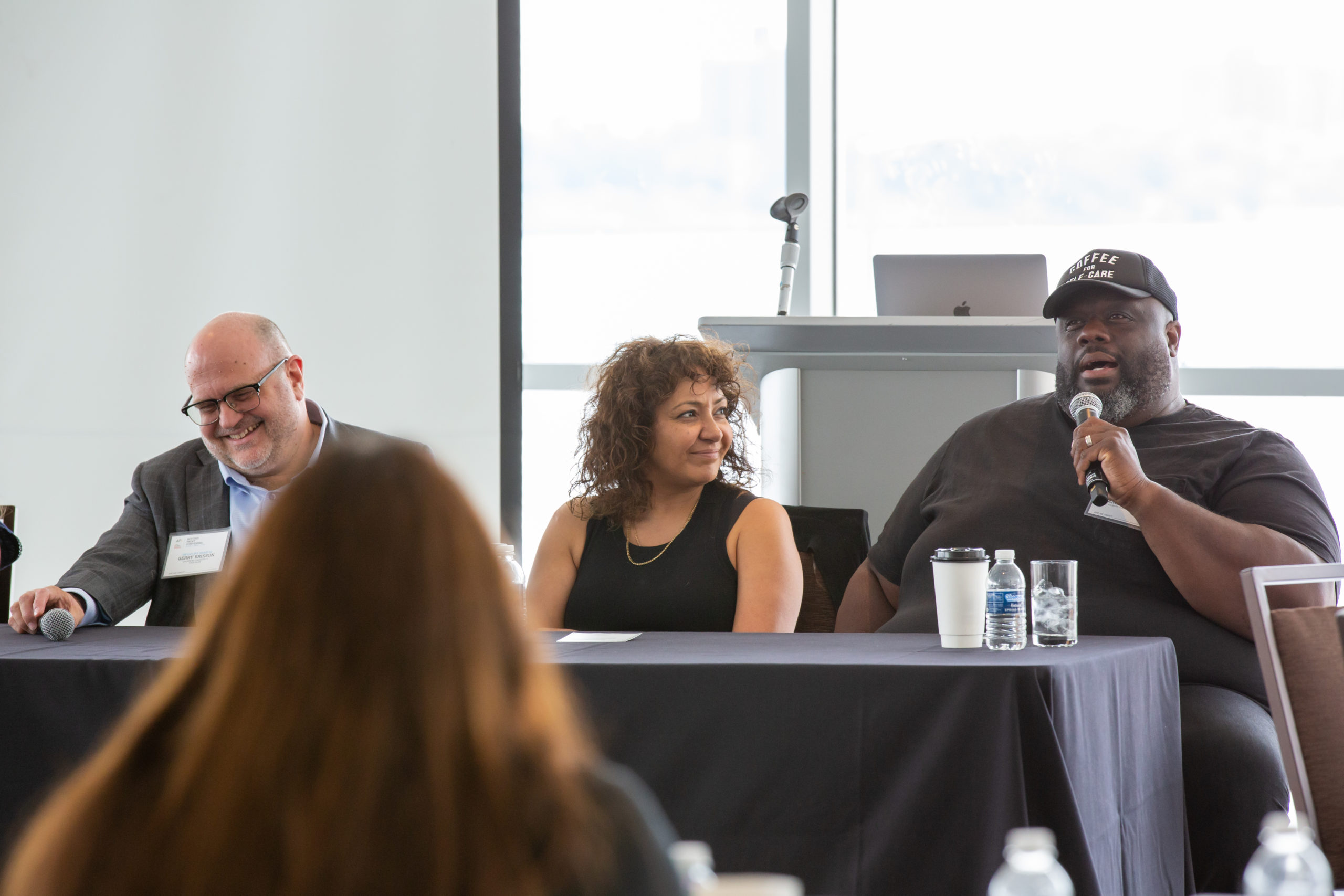Managing change in news organizations starts with leading people well
Sam Ragland, American Press Institute,
Emily Ristow (from left), Gerry Brisson, Roula David and James Feagin IV participate in a panel discussion in Detroit in June. (Photo by Julianne Lindsey)
Managing change is hard, especially in depleted news organizations serving communities often suspicious of their work. But it’s not impossible, as these Detroit business leaders explained to a room of local news publishers.This piece features tips from Gerry Brisson, Roula David and James Feagin IV, who spoke at a June 2023 gathering in Detroit that was an extension of the Beyond Print program.
Beyond Print was created by the American Press Institute and The Lenfest Institute for Journalism to help guide publishers away from print-centric revenue models toward a sustainable digital future. Beyond Print is funded by an anchor donation from the Andrew and Julie Klingenstein Family Fund with additional funding from The Knight-Lenfest Local News Transformation Fund, a joint initiative of the John S. and James L. Knight Foundation and The Lenfest Institute for Journalism.
More on Beyond Print:
The American Press Institute believes in the power of diverse lived experiences and in the knowledge held by those who don’t do this work for a living. So when API and The Lenfest Institute for Journalism convened a group of newspaper leaders, we knew their voices couldn’t be the only ones in the room.
In June 2023, Emily Ristow, API’s director of local news transformation, moderated this all-star cast of Detroit business leaders who, rightfully so, see themselves first as community members. They are:
- Gerry Brisson, President and CEO, Gleaners Community Food Bank
- Roula David, Vice President, 1xRUN
- James Feagin IV, Founder & Chief Strategist, projects+PEOPLE
There are many things worth noting about this inspiring conversation. Three of them are: change management tips, community engagement tactics and leadership principles. The third being especially crucial as managing the trust of people is foundational when moving toward a future less supported by legacy products such as print newspapers and television broadcasts.
What leaders do who manage change well
A theme of the convening came from a “beyond print” trailblazer, Bill Patterson of the Denton Record-Chronicle: “Don’t let the fear control you,” he told the group over and over and over. Leaders who manage change well are willing to take calculated risks and take on the ambiguity. They are not afraid to be first.
As our panel shared: Leaders are put in place to lead — not just to manage. This makes transparency, arguably the most praised currency of the news industry, not just important for the communities we serve but also for the journalists we lead.
James Feagin IV, an economic development practitioner, shared during the panel: As leaders, often “we draw a moat around us in our role and our work, and we choose to manage and lead [our people] from there. We don’t cross the moat. But I have expectations of them, [and I need] to understand their world and their decisions.” Leaders need to cross the moat, he went on, to cultivate independent and critical thinking, and to allow team members to bring more to the table.
Read more about Feagin’s work in Detroit
If you want to know how to manage change, our panel of daring, inspiring entrepreneurs would encourage you to:
- Lead from all sides of the room, not just from the most protected side.
- Let people know where they stand and where you stand as the one in charge.
- Embrace difficult conversations as the fair and deserved interactions that they are.

James Feagin IV (right) speaks to local newspaper leaders during a panel discussion with Gerry Brisson (left) and Roula David in Detroit. (Photo by Julianne Lindsey)
Why your story of change is crucial to community engagement
Perhaps the most inspiring part of this discussion came when the panelists prioritized community membership over business ownership — and this ideology sustained them during and beyond the pandemic. The idea probably sounds terrifying, but it’s worth sharing here and entertaining on your own.
Some questions to consider as you, News Leader, begin to verbalize the story of your journalists, their journalism and the institution that contains them:
- Who are we to the community?
- Is what you think is your impact actually understood and resonating with your community? What receipts do you have? (Trusting News has tips on this.)
- What are we trying to do for our community and for ourselves? And what might be hindering this work that should be let go?
- How do we do this work, and manage this change, with a sense of passion and community?
- How do we display the integrity (or sub-in a value of your organization) that is core to our values — especially when the resources are strapped and we’re charting unknown waters?
If you were to share these questions with your leadership team, what answers might you get, and how might they ready your story for your community? Check out the story and digital transformation of Alabama Media Group for inspiration and example.
How starting over can accelerate trust — and change
One of the panelists, food bank CEO Gerry Brisson, shared how his food bank had risen to the new demands brought on by the COVID-19 pandemic but didn’t maintain that altitude when things slowed and began to shrink. He noted that all he’d proven was that he could overwork people in the name of the mission, but he’d never really acknowledged the work in the name of the values. So, he started over.
He re-invested in onboarding (something newsrooms also know needs work), something he saw as the glue that bound together every facet of the food bank, from the leadership ranks to the mouths being fed and every person in between those two worlds. He stopped disconnecting the mission from the values, and in doing so he built trust with his team and among his team.
Read more about Gleaners Community Food Bank
If you are managing your shop but not leading your people, this group of business leaders would implore you to pivot. It’s never too late to start over.
Some questions from serial entrepreneur Roula David to get you started:
- Are you holding intentional 1:1s with your staff?
- How are you conveying the future for them and not just for the industry at large — especially for those who don’t have your experience or vantage point?
- Do you know who’s engaged and interested in the work? For those who are disengaged, what’s the strategy to reconnect them to the values and the mission of the work?
- Have you communicated a North Star for the organization? Have your beat editors and department heads also shared a more specific North Star for the teams?
For this room of news publishers on this very rainy day in Detroit, these non-news panelists offered up an idea that bears repeating, revisiting and refreshing: Caring, transparent leadership is just as important in managing change as the tactics of that change.